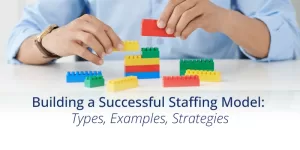HR Recruitment Strategies: What Makes a Good HR Professional?
Human resources is the backbone of any thriving organization. Beyond managing payroll and benefits—it’s about shaping a workplace where employees feel valued, supported, and equipped to succeed. The right HR professional can drive innovation, foster a culture of inclusivity, and ensure your company stays compliant in an ever-evolving regulatory landscape.
Recruiting HR professionals has become more complex as organizations navigate challenges such as high turnover rates, remote work dynamics, and the demand for greater diversity. Successful HR recruitment demands not only a clear understanding of essential skills but also a strategic approach tailored to meet these challenges head-on.
To tackle these challenges effectively, you need HR professionals who embody a blend of technical and interpersonal expertise. Knowing the qualities of a good HR professional is the first step to identifying the right candidates. Here are the qualities that define excellence in the field—and how strategic HR recruitment can help you secure the talent you need.
What Makes a Good HR Professional?

A good HR professional ensures they can meet the demands of modern organizations. If your organization is looking to identify and recruit the right HR talent, you’ll need to understand the traits and skills that define excellence in the field. Below are the critical characteristics to focus on.
Hard Skills for HR Professionals
A strong foundation in technical skills sets an exceptional professional in human resources apart. These include:
- Expertise in labor laws and compliance: HR professionals must stay updated on ever-changing local, state, and federal labor regulations. They ensure the organization operates legally while proactively addressing potential compliance risks, such as wage disputes or workplace safety violations.
- Proficiency in recruitment techniques and HR technology: Skilled HR professionals use modern tools like applicant tracking systems (ATS), human resources information system (HRIS) platforms, and data analytics software to streamline recruitment, onboarding, and workforce management. Familiarity with these tools improves efficiency and enhances the candidate experience.
- Data-driven decision-making: HR professionals are capable of leveraging workforce data to predict hiring needs, track employee performance, and identify turnover trends. This analytical approach ensures that HR strategies are evidence-based and aligned with organizational goals.
- Strategic workforce planning: Beyond current hiring needs, strategic workforce planning enables HR professionals to anticipate future talent demands, identify skills gaps, and build a robust pipeline of candidates.
- Knowledge of compensation and benefits systems: Designing attractive yet sustainable compensation packages is critical for attracting and retaining top talent. It requires balancing equity, managing budgets, and benchmarking against industry standards.
Soft Skills for HR Professionals

While technical skills are essential, the interpersonal side of HR is equally important. The best HR professionals excel in the following areas:
- Interpersonal communication: HR professionals often act as the bridge between employees and leadership. From managing sensitive employee concerns to negotiating offers, they need excellent communication skills to build trust, resolve conflicts, and convey information effectively.
- Conflict resolution and emotional intelligence: Navigating workplace disputes requires the ability to de-escalate tense situations while maintaining fairness. Emotional intelligence helps HR professionals understand diverse perspectives, foster mutual respect, and mediate with empathy.
- Adaptability and innovative thinking: The modern workplace evolves rapidly, with challenges like remote work, diversity, and employee well-being taking center stage. Great HR professionals remain flexible and approach these challenges with creative, forward-thinking solutions.
- Leadership and influence: HR professionals often guide organizational change, such as implementing new policies or restructuring teams. Strong leadership skills empower them to advocate for employees while supporting business objectives.
- Cultural intelligence: It’s important to understand and respect cultural differences, given today’s diverse workplaces. HR professionals with high cultural intelligence foster inclusivity and ensure that policies and practices align with a globally diverse workforce.
6 Key HR Recruitment Strategies
Finding the right HR professionals for your organization requires a structured approach that combines strategies such as clear role definitions, innovative sourcing methods, and thorough evaluations. Through these, you can create an HR recruitment process that attracts top-tier talent and aligns with your organization’s goals.
1. Precisely define the role
Start by identifying the specific skills, experience, and qualities your organization needs. Consider whether the position requires expertise in compliance, employee engagement, or strategic workforce planning. This clarity ensures you attract candidates whose abilities align with your needs.

For example, a startup expanding its workforce may need an HR generalist with experience in recruitment technology and scalable processes. Meanwhile, a multinational corporation might prioritize an HR director skilled in global compliance and diversity initiatives. Tailoring your job description with these details makes your role more appealing to the right candidates.
2. Leverage multiple sourcing channels
Utilizing diverse sourcing methods is beneficial to finding top HR talent. While platforms like LinkedIn offer broad networks of candidates, working with a specialized firm, especially a human resource recruitment agency, provides a significant advantage. A recruiting firm’s deep industry connections also allow them to access passive candidates—professionals not actively seeking new roles but open to opportunities that align with their skills and career goals.
Additionally, recruiting firms maintain relationships with universities and certification bodies, connecting you with emerging talent or professionals engaged in continuous learning. This approach ensures a steady pipeline of capable HR professionals tailored to your requirements.
Recruiting Connection, for instance, goes beyond self-service tools by offering tailored solutions and exclusive access to pre-vetted candidates who match your specific needs.
If you need an experienced HR manager for organizational restructuring, we can leverage our network to identify candidates with proven success in similar roles, even those not visible on platforms like LinkedIn.
3. Incorporate pre-hiring assessments

Adding pre-hiring assessments to your recruitment process ensures you evaluate candidates’ technical and interpersonal capabilities effectively. These assessments can include skill-based evaluations, personality tests, and leadership aptitude tests.
Suppose you’re hiring for an HR leadership position. Present candidates with a case study where they analyze employee turnover data and propose actionable strategies to address the issue. Their approach will demonstrate analytical thinking, practical HR expertise, and problem-solving ability.
Sample scenario: A mid-sized retail company has experienced a 25% turnover rate in its customer service department over the past year, compared to an industry average of 15%. Exit interviews point to burnout, lack of career growth, and perceived pay inequities.
You can ask candidates to:
- Analyze the data
- Identify root causes
- Propose a 6-month action plan to address the issue
Their deliverable could include a brief report or presentation outlining strategies for reducing turnover, improving engagement, and tracking success metrics.
4. Implement collaborative hiring practices
Collaborative hiring brings key stakeholders into the recruitment process, creating a more holistic evaluation of candidates. Involve team members, direct supervisors, and even potential peers to ensure the candidate fits not only the role but also the organization’s culture and team dynamics.
For an HR generalist role, consider involving team leads from other departments in panel interviews. Their input can reveal how well the candidate might collaborate across functions and address department-specific challenges.
5. Evaluate candidates comprehensively
A robust evaluation process ensures you identify the best HR professionals. For senior roles, consider partnering with executive recruiters who provide an additional layer of expertise, helping you assess candidates who possess strategic vision and operational excellence.
Apart from resumes and generic interviews, incorporate behavioral and situational assessments that reveal a candidate’s technical skills and ability to handle real-world challenges.
- Behavioral interviews: Focus on past experiences to gauge a candidate’s problem-solving skills and adaptability. For example, ask: “Can you describe a time you navigated a difficult employee relations issue? How did you resolve it, and what was the outcome?”
- Scenario-based exercises: Provide hypothetical workplace situations that mimic challenges they might face in the role. For example, present a case where employee engagement scores have dropped and ask candidates to outline their strategy to address the issue.
- Skill-based evaluations: Assign practical tasks such as analyzing workforce data or drafting a diversity initiative. This approach highlights how candidates apply their expertise to achieve measurable results.
6. Prioritize cultural alignment
An exceptional HR professional excels in technical skills and aligns with your organization’s culture and values. Evaluate their approach to leadership, conflict resolution, and inclusivity to ensure they fit seamlessly into your team.
If your company values innovation, ask candidates to share examples of how they’ve introduced creative solutions in previous roles. Their response will provide insight into their adaptability and alignment with your culture.
Your Next Great Hire Is Closer Than You Think

The quality of your HR team directly shapes the success of your organization. Skilled HR professionals don’t just fill roles—they build a thriving workplace, align employee goals with business strategies, and create environments where talent can flourish. Investing in the right recruitment strategies ensures you attract individuals who embody the expertise and leadership necessary to navigate today’s workforce challenges.
In a competitive hiring landscape, partnering with an expert who truly understands HR complexities and your business needs can be a game-changer. The right ally can simplify your hiring process and deliver candidates who surpass expectations.
Recruiting Connection can offer comprehensive human resource recruiters in Utah or help you secure talent across roles and industries. As a trusted recruiting agency in Salt Lake City, we specialize in finding exceptional candidates for HR positions and leadership roles. Let our experienced team guide your search and help you build a workforce that drives success.
Take the first step toward transformative hiring—contact us today!

Struggling to find top
talent for your business?
Connect with the expertes at Recruiting Connection and discover the difference our full-service recruitment can make.
Contact Us Today
















